GitHub Tag Vs Release
What
GitHub Tags and Releases are two related concepts in version control that serve to mark specific points in a repository’s history, but they have different purposes and implications.
What are Github Tags:
Tags are references that point to specific commits in a Git repository. They are typically used to mark release points (like v1.0, and v2.0) or significant milestones in a project. Tags can be lightweight or annotated:
- Lightweight Tags: Essentially bookmarks to a specific commit. They don’t store any extra information, such as the tagger’s name, email, or date.
- Annotated Tags: They are stored as full objects in the Git database. They include metadata like the tagger’s name, email, date, and message. Annotated tags are preferred for release versions as they provide more context.
What are Releases:
Releases are a way to package a specific version of your software, including the associated binary files, release notes, and other assets. A release is created from a tag, effectively tying the tagged commit to a specific version of the software that can be easily downloaded and shared. Each release can contain:
- Release notes that describe the changes or features included.
- Attached files, such as compiled binaries or documentation.
- Versioning information that communicates what has changed since the previous release.
Why
GitHub Tags:
- Versioning: Tags provide a way to indicate the version of the codebase at a specific point in time, facilitating easier navigation and management of versions.
- Simplicity: Lightweight tags allow for quick referencing of commits without the overhead of additional information.
Releases:
- Distribution: Releases make it easier to distribute software by bundling everything users need to get started, including binaries and documentation.
- Documentation: Release notes enhance communication with users about what’s new, what has changed, or what bugs have been fixed.
By understanding the differences between GitHub Tags and Releases, software engineering teams can leverage both features effectively to manage their projects and deliver software more efficiently.
Subscribe to Hatica's blog
Get bi-weekly emails with the latest from Hatica's blog
Ready to dive in? Start your free trial today

